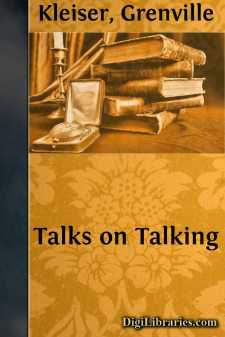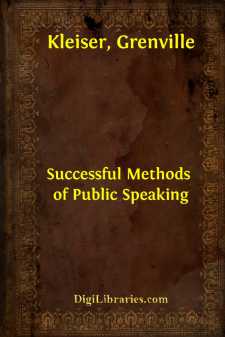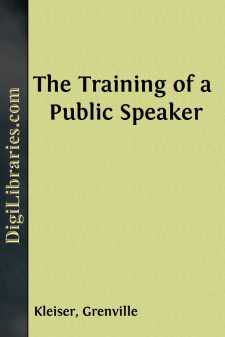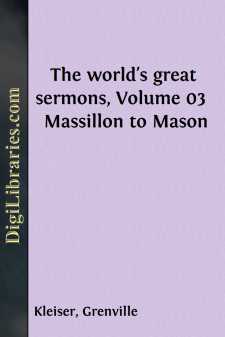Categories
- Antiques & Collectibles 13
- Architecture 36
- Art 48
- Bibles 22
- Biography & Autobiography 813
- Body, Mind & Spirit 142
- Business & Economics 28
- Children's Books 17
- Children's Fiction 14
- Computers 4
- Cooking 94
- Crafts & Hobbies 4
- Drama 346
- Education 46
- Family & Relationships 57
- Fiction 11829
- Games 19
- Gardening 17
- Health & Fitness 34
- History 1377
- House & Home 1
- Humor 147
- Juvenile Fiction 1873
- Juvenile Nonfiction 202
- Language Arts & Disciplines 88
- Law 16
- Literary Collections 686
- Literary Criticism 179
- Mathematics 13
- Medical 41
- Music 40
- Nature 179
- Non-Classifiable 1768
- Performing Arts 7
- Periodicals 1453
- Philosophy 64
- Photography 2
- Poetry 896
- Political Science 203
- Psychology 42
- Reference 154
- Religion 513
- Science 126
- Self-Help 84
- Social Science 81
- Sports & Recreation 34
- Study Aids 3
- Technology & Engineering 59
- Transportation 23
- Travel 463
- True Crime 29
Talks on Talking
Categories:
Description:
Excerpt
THE ART OF TALKING
The charm of conversation chiefly depends upon the adaptability of the participants. It is a great accomplishment to be able to enter gently and agreeably into the moods of others, and to give way to them with grace and readiness.
The spirit of conversation is oftentimes more important than the ideas expressed. What we are rather than what we say has the most permanent influence upon those around us. Hence it is that where a group of persons are met together in conversation, it is the inner life of each which silently though none the less surely imparts tone and character to the occasion.
It requires vigorous self-discipline so to cultivate the feelings of kindness and sympathy that they are always in readiness for use. These qualities are essential to agreeable and profitable intercourse, though comparatively few people possess them.
Burke considered manners of more importance than laws. Sidney Smith described manners as the shadows of virtues. Dean Swift defined manners as the art of putting at ease the people with whom we converse. Chesterfield said manners should adorn knowledge in order to smooth its way through the world. Emerson spoke of manners as composed of petty sacrifices.
We all recognize that a winning manner is made up of seemingly insignificant courtesies, and of constant little attentions. A person of charming manner is usually free from resentments, inquisitiveness, and moods.
Personality plays a large part in interesting conversation. Precisely the same phraseology expressed by two different persons may make two wholly different impressions, and all because of the difference in the personalities of the speakers.
The daily mental life of a man indelibly impresses itself upon his face, where it can be unmistakably read by others. What a person is, innately and habitually, unconsciously discloses itself in voice, manner, and bearing. The world ultimately appraises a man at his true value.
The best type of talker is slow to express positive opinions, is sparing in criticism, and studiously avoids a tone or word of finality. It has been well said that "A talker who monopolizes the conversation is by common consent insufferable, and a man who regulates his choice of topics by reference to what interests not his hearers but himself has yet to learn the alphabet of the art. Conversation is like lawn-tennis, and requires alacrity in return at least as much as vigor in service. A happy phrase, an unexpected collocation of words, a habitual precision in the choice of terms, are rare and shining ornaments of conversation, but they do not for an instant supply the place of lively and interesting matter, and an excessive care for them is apt to tell unfavorably on the substance of discourse."
When Lord Beaconsfield was talking his way into social fame, someone said of him, "I might as well attempt to gather up the foam of the sea as to convey an idea of the extraordinary language in which he clothed his description. There were at least five words in every sentence that must have been very much astonished at the use they were put to, and yet no others apparently could so well have expressed his idea. He talked like a racehorse approaching the winning-post—every muscle in action, and the utmost energy of expression flung out into every burst."
We are told that Matthew Arnold combined all the characteristics of good conversation—politeness, vivacity, sympathy, interestedness, geniality, a happy choice of words, and a never-failing humor. When he was once asked what was his favorite topic for conversation, he instantly answered, "That in which my companion is most interested."
Courtesy, it will be noted, is the fundamental basis of good conversation. We must show habitual consideration and kindliness towards others if we would attract them to us....

















